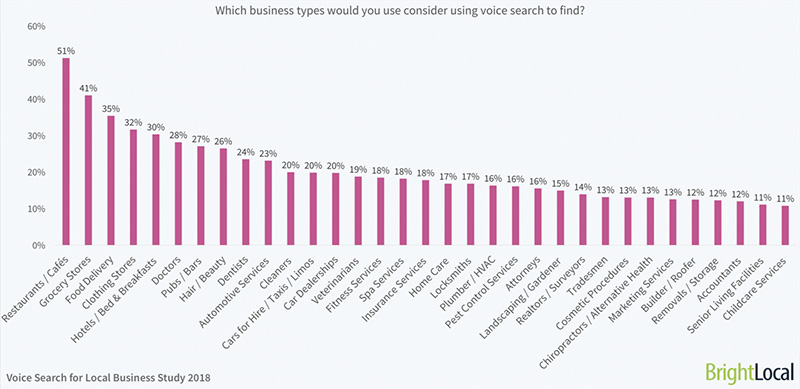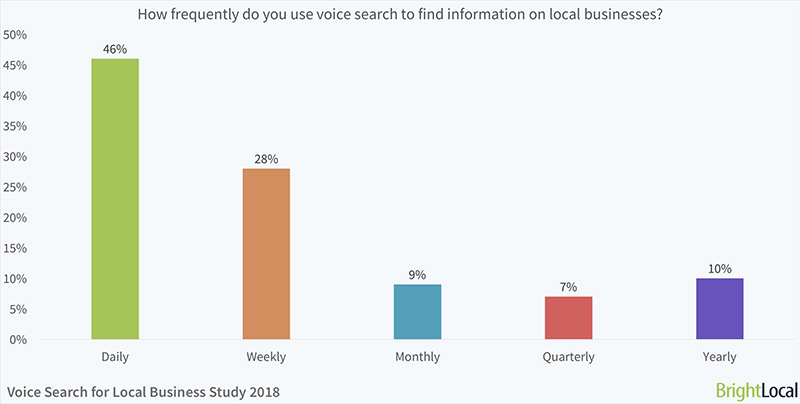The current search engine optimization (SEO) landscape is already tricky for local
business.
Google Maps trimmed its business listings down from seven to
three listings in search, plus with new features that display information directly
in search, people no longer need to visit your website to get the information
they need – resulting in fewer clicks to your site.
Then add in voice search.
2018 has already
been a big year for voice search and virtual assistants, with Alexa making its way into hotel rooms and
Google Home racing ahead in sales. Soon, local
businesses will be facing challenges and opportunities for search within these
virtual assistants.
Google introduced
one of these opportunities at their I/O conference in May. Google Duplex will
call local businesses for you, replicating the human voice as closely as
possible, and its artificial intelligence (AI) will have conversations with
staff to make reservations and orders on your behalf. (Click here and listen to the recording – it’s pretty hard to tell!)
While that
technology itself poses a few ethical questions, the idea of these types of
technologies is the focus of this article. Mainly, how does the current use of
voice assistants affect local businesses?
What Do Consumers Want from Voice Search and Local
Business?
In a recent survey done
by BrightLocal, consumers were asked how they used voice assistants and voice search for local business.
One of the questions asked about future developments in voice search and showed
that, of all the potential uses for local business, people just really want to
be able to make reservations and order food without talking to any humans.

The top industries that the survey discovered consumers
search for using voice search were:
1. Restaurants / Cafés (51% of
consumers would use voice search to find)
2. Grocery stores (41%)
3. Food delivery (35%)
4. Hotels / Bed & Breakfasts (30%)
5. Clothing stores (32%)
These survey results firmly back up Google’s strategy on
voice search. And while these industries experience the most demand for local
voice searches, even the businesses at the lower end, such as accountants,
builders, and childcare services still risk missing out on potential customers
if they’re not able to be found using voice search.
How Often Is Voice
Search Used to Find Information on Local Businesses?
The ‘Voice Search for Local Business Study’ also revealed
that 46% of voice search users utilize voice search to find local businesses
daily. That means that nearly half of the people with a voice assistant on
their phone are asking Alexa, Google, Cortana, Siri and friends for details on
local businesses almost every single day.

Voice search has been positioned a staple in the household
through virtual assistants and doesn’t appear to be going away anytime soon. In
fact, with its place in the search ecosystem pretty much secured, voice search
is only going to grow – along with its affects on local businesses.
What Can Your Local
Business Do With Voice Search?
Even with the rise of home assistants and voice search as a
whole, it’s important to realize that it’s still a relatively new technology.
So while there are a few things that local businesses can do to help their
chances of appearing in voice search results, remember that it’s a growing
technology and for now you’re really just laying the groundwork for the future
as well as the present.
One thing you can do is to ensure your website is fully
marked up with structured data. Google has said that structured data is only
going to play a bigger part in ranking for rich results and featured snippets,
so in order to “future-proof” your website, include all the relevant structured
markup possible.
Other traditional SEO factors will continue to play a part
in voice search results. Ranking in search always depends on a variety of
factors, but here are the key areas to consider:
- Relevance: how relevant your business / website is to the
query
- Prominence: review ratings, mentions on social media and in
the press
- Proximity: how close the business is to the searcher
When voice is used ‘on the go’, proximity places a much
larger part in rankings, as most people are searching for something nearby.
Conclusion
As voice search grows, it will present new opportunities and
challenges for local businesses as search engines work to make experiences more
fluid and enjoyable for the user.
Your part as a business owner is to start preparing your business for the future today. If you’re looking for some advice on how to take advantage of new technology or just get your marketing working, please call us at (407) 682-2222 or fill out the "Get In Touch With Us" form below.